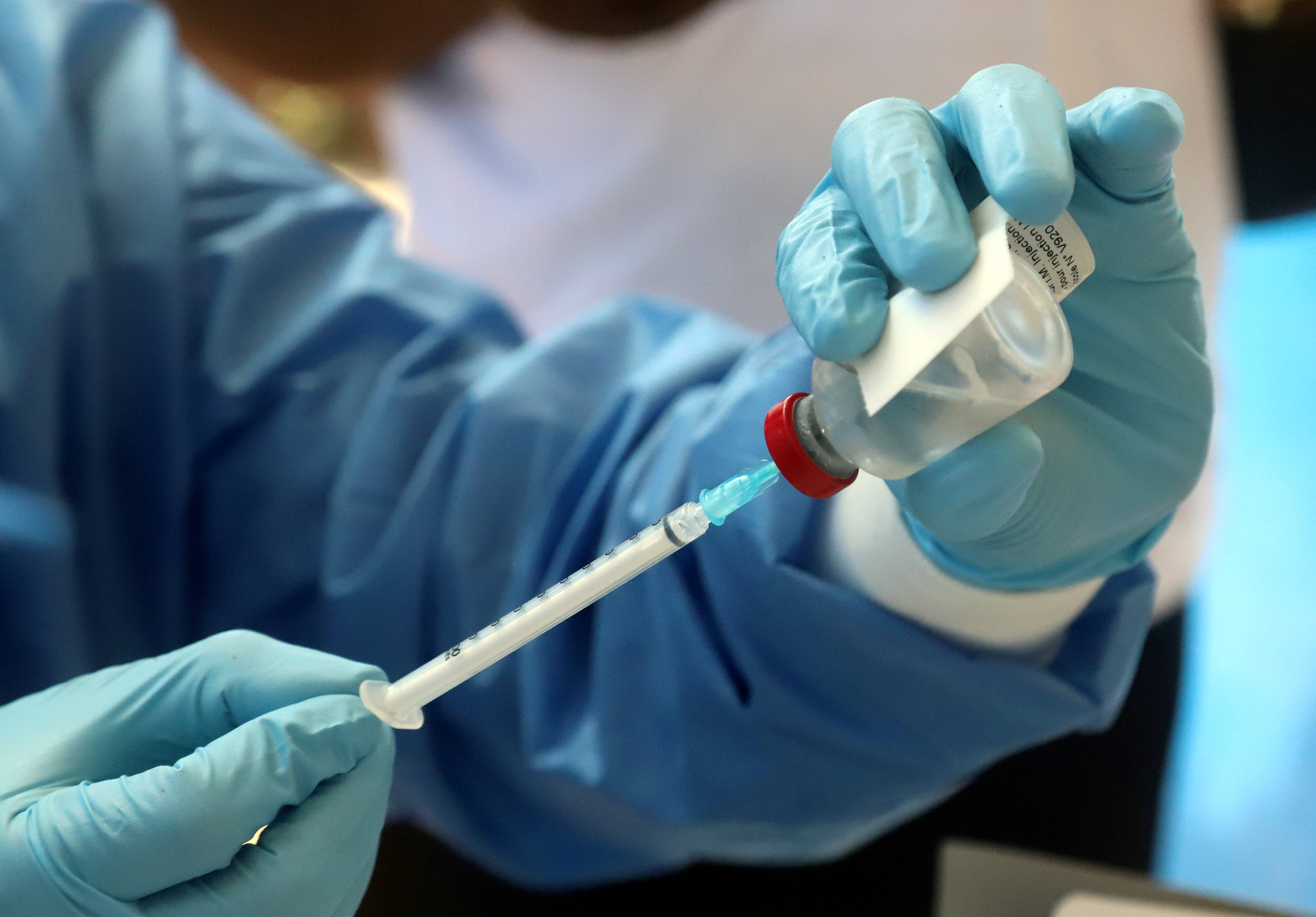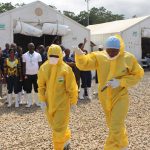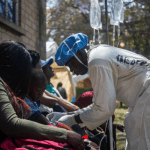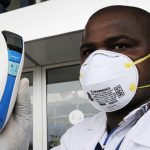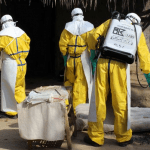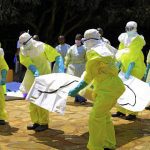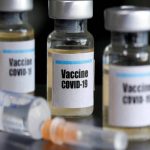The Democratic Republic of the Congo (DRC) has started vaccination against the latest Ebola outbreak in the northeaster North Kivu province, the World Health Organisation (WHO) said on Thursday.
The vaccination has targeted high risk populations in North Kivu, in which the provincial health minister and the provincial coordinator of the Expanded Program on Immunization were the first to be vaccinated.
They were followed by first line health workers from the Mangina health center, 30 km from the town of Beni, who had been in contact with people who were confirmed cases of Ebola.
“Vaccines are an important tool in the fight against Ebola. This is why it has been a priority to move them rapidly into place to begin protecting our health workers and the affected population,” said DRC Health Minister Dr. Oly Ilunga.
A total of 3,220 doses of rVSV-ZEBOV Ebola vaccine are currently available in the country, while supplementary doses have been requested.
While the vaccine goes through the licensing process, an agreement between Gavi, the Vaccine Alliance, and Merck, the developer of the vaccine, ensures that additional investigational doses of the vaccine are available.
The vaccination operation was launched just one week after the announcement of a second outbreak of Ebola this year in the country, in which a total of 44 cases have been reported so far as of Wednesday, including 17 confirmed and 27 probable.
The death toll has risen to 36.
Earlier on Tuesday, Peter Salama, deputy director-general of emergency preparedness and response at the WHO, said on Twitter that results of genetic analysis had confirmed Ebola Zaire strain was the cause of the latest outbreak in the DRC.
The WHO, he said, is providing logistical support for the establishment of the cold chain and sending supplies needed for the vaccinations, in addition to supporting the negotiation of protocols with the manufacturer and national authorities.
He said that the WHO was also supporting the deployment of vaccination experts from Guinea to work alongside national staff, who began the vaccination.
However, North Kivu province and eastern areas of the adjacent Ituri province are among the most populated in the DRC, with many major cities, which brings heightened risks and new challenges in the fight against Ebola, according to Dr. Salama, who has called for fighting the outbreak with all tools, old and new
The Democratic Republic of the Congo (DRC) has started vaccination against the latest Ebola outbreak in the northeaster North Kivu province, the World Health Organisation (WHO) said on Thursday.
The vaccination has targeted high risk populations in North Kivu, in which the provincial health minister and the provincial coordinator of the Expanded Program on Immunization were the first to be vaccinated.
They were followed by first line health workers from the Mangina health center, 30 km from the town of Beni, who had been in contact with people who were confirmed cases of Ebola.
“Vaccines are an important tool in the fight against Ebola. This is why it has been a priority to move them rapidly into place to begin protecting our health workers and the affected population,” said DRC Health Minister Dr. Oly Ilunga.
A total of 3,220 doses of rVSV-ZEBOV Ebola vaccine are currently available in the country, while supplementary doses have been requested.
While the vaccine goes through the licensing process, an agreement between Gavi, the Vaccine Alliance, and Merck, the developer of the vaccine, ensures that additional investigational doses of the vaccine are available.
The vaccination operation was launched just one week after the announcement of a second outbreak of Ebola this year in the country, in which a total of 44 cases have been reported so far as of Wednesday, including 17 confirmed and 27 probable.
The death toll has risen to 36.
Earlier on Tuesday, Peter Salama, deputy director-general of emergency preparedness and response at the WHO, said on Twitter that results of genetic analysis had confirmed Ebola Zaire strain was the cause of the latest outbreak in the DRC.
The WHO, he said, is providing logistical support for the establishment of the cold chain and sending supplies needed for the vaccinations, in addition to supporting the negotiation of protocols with the manufacturer and national authorities.
He said that the WHO was also supporting the deployment of vaccination experts from Guinea to work alongside national staff, who began the vaccination.
However, North Kivu province and eastern areas of the adjacent Ituri province are among the most populated in the DRC, with many major cities, which brings heightened risks and new challenges in the fight against Ebola, according to Dr. Salama, who has called for fighting the outbreak with all tools, old and new
The Democratic Republic of the Congo (DRC) has started vaccination against the latest Ebola outbreak in the northeaster North Kivu province, the World Health Organisation (WHO) said on Thursday.
The vaccination has targeted high risk populations in North Kivu, in which the provincial health minister and the provincial coordinator of the Expanded Program on Immunization were the first to be vaccinated.
They were followed by first line health workers from the Mangina health center, 30 km from the town of Beni, who had been in contact with people who were confirmed cases of Ebola.
“Vaccines are an important tool in the fight against Ebola. This is why it has been a priority to move them rapidly into place to begin protecting our health workers and the affected population,” said DRC Health Minister Dr. Oly Ilunga.
A total of 3,220 doses of rVSV-ZEBOV Ebola vaccine are currently available in the country, while supplementary doses have been requested.
While the vaccine goes through the licensing process, an agreement between Gavi, the Vaccine Alliance, and Merck, the developer of the vaccine, ensures that additional investigational doses of the vaccine are available.
The vaccination operation was launched just one week after the announcement of a second outbreak of Ebola this year in the country, in which a total of 44 cases have been reported so far as of Wednesday, including 17 confirmed and 27 probable.
The death toll has risen to 36.
Earlier on Tuesday, Peter Salama, deputy director-general of emergency preparedness and response at the WHO, said on Twitter that results of genetic analysis had confirmed Ebola Zaire strain was the cause of the latest outbreak in the DRC.
The WHO, he said, is providing logistical support for the establishment of the cold chain and sending supplies needed for the vaccinations, in addition to supporting the negotiation of protocols with the manufacturer and national authorities.
He said that the WHO was also supporting the deployment of vaccination experts from Guinea to work alongside national staff, who began the vaccination.
However, North Kivu province and eastern areas of the adjacent Ituri province are among the most populated in the DRC, with many major cities, which brings heightened risks and new challenges in the fight against Ebola, according to Dr. Salama, who has called for fighting the outbreak with all tools, old and new
The Democratic Republic of the Congo (DRC) has started vaccination against the latest Ebola outbreak in the northeaster North Kivu province, the World Health Organisation (WHO) said on Thursday.
The vaccination has targeted high risk populations in North Kivu, in which the provincial health minister and the provincial coordinator of the Expanded Program on Immunization were the first to be vaccinated.
They were followed by first line health workers from the Mangina health center, 30 km from the town of Beni, who had been in contact with people who were confirmed cases of Ebola.
“Vaccines are an important tool in the fight against Ebola. This is why it has been a priority to move them rapidly into place to begin protecting our health workers and the affected population,” said DRC Health Minister Dr. Oly Ilunga.
A total of 3,220 doses of rVSV-ZEBOV Ebola vaccine are currently available in the country, while supplementary doses have been requested.
While the vaccine goes through the licensing process, an agreement between Gavi, the Vaccine Alliance, and Merck, the developer of the vaccine, ensures that additional investigational doses of the vaccine are available.
The vaccination operation was launched just one week after the announcement of a second outbreak of Ebola this year in the country, in which a total of 44 cases have been reported so far as of Wednesday, including 17 confirmed and 27 probable.
The death toll has risen to 36.
Earlier on Tuesday, Peter Salama, deputy director-general of emergency preparedness and response at the WHO, said on Twitter that results of genetic analysis had confirmed Ebola Zaire strain was the cause of the latest outbreak in the DRC.
The WHO, he said, is providing logistical support for the establishment of the cold chain and sending supplies needed for the vaccinations, in addition to supporting the negotiation of protocols with the manufacturer and national authorities.
He said that the WHO was also supporting the deployment of vaccination experts from Guinea to work alongside national staff, who began the vaccination.
However, North Kivu province and eastern areas of the adjacent Ituri province are among the most populated in the DRC, with many major cities, which brings heightened risks and new challenges in the fight against Ebola, according to Dr. Salama, who has called for fighting the outbreak with all tools, old and new
The Democratic Republic of the Congo (DRC) has started vaccination against the latest Ebola outbreak in the northeaster North Kivu province, the World Health Organisation (WHO) said on Thursday.
The vaccination has targeted high risk populations in North Kivu, in which the provincial health minister and the provincial coordinator of the Expanded Program on Immunization were the first to be vaccinated.
They were followed by first line health workers from the Mangina health center, 30 km from the town of Beni, who had been in contact with people who were confirmed cases of Ebola.
“Vaccines are an important tool in the fight against Ebola. This is why it has been a priority to move them rapidly into place to begin protecting our health workers and the affected population,” said DRC Health Minister Dr. Oly Ilunga.
A total of 3,220 doses of rVSV-ZEBOV Ebola vaccine are currently available in the country, while supplementary doses have been requested.
While the vaccine goes through the licensing process, an agreement between Gavi, the Vaccine Alliance, and Merck, the developer of the vaccine, ensures that additional investigational doses of the vaccine are available.
The vaccination operation was launched just one week after the announcement of a second outbreak of Ebola this year in the country, in which a total of 44 cases have been reported so far as of Wednesday, including 17 confirmed and 27 probable.
The death toll has risen to 36.
Earlier on Tuesday, Peter Salama, deputy director-general of emergency preparedness and response at the WHO, said on Twitter that results of genetic analysis had confirmed Ebola Zaire strain was the cause of the latest outbreak in the DRC.
The WHO, he said, is providing logistical support for the establishment of the cold chain and sending supplies needed for the vaccinations, in addition to supporting the negotiation of protocols with the manufacturer and national authorities.
He said that the WHO was also supporting the deployment of vaccination experts from Guinea to work alongside national staff, who began the vaccination.
However, North Kivu province and eastern areas of the adjacent Ituri province are among the most populated in the DRC, with many major cities, which brings heightened risks and new challenges in the fight against Ebola, according to Dr. Salama, who has called for fighting the outbreak with all tools, old and new
The Democratic Republic of the Congo (DRC) has started vaccination against the latest Ebola outbreak in the northeaster North Kivu province, the World Health Organisation (WHO) said on Thursday.
The vaccination has targeted high risk populations in North Kivu, in which the provincial health minister and the provincial coordinator of the Expanded Program on Immunization were the first to be vaccinated.
They were followed by first line health workers from the Mangina health center, 30 km from the town of Beni, who had been in contact with people who were confirmed cases of Ebola.
“Vaccines are an important tool in the fight against Ebola. This is why it has been a priority to move them rapidly into place to begin protecting our health workers and the affected population,” said DRC Health Minister Dr. Oly Ilunga.
A total of 3,220 doses of rVSV-ZEBOV Ebola vaccine are currently available in the country, while supplementary doses have been requested.
While the vaccine goes through the licensing process, an agreement between Gavi, the Vaccine Alliance, and Merck, the developer of the vaccine, ensures that additional investigational doses of the vaccine are available.
The vaccination operation was launched just one week after the announcement of a second outbreak of Ebola this year in the country, in which a total of 44 cases have been reported so far as of Wednesday, including 17 confirmed and 27 probable.
The death toll has risen to 36.
Earlier on Tuesday, Peter Salama, deputy director-general of emergency preparedness and response at the WHO, said on Twitter that results of genetic analysis had confirmed Ebola Zaire strain was the cause of the latest outbreak in the DRC.
The WHO, he said, is providing logistical support for the establishment of the cold chain and sending supplies needed for the vaccinations, in addition to supporting the negotiation of protocols with the manufacturer and national authorities.
He said that the WHO was also supporting the deployment of vaccination experts from Guinea to work alongside national staff, who began the vaccination.
However, North Kivu province and eastern areas of the adjacent Ituri province are among the most populated in the DRC, with many major cities, which brings heightened risks and new challenges in the fight against Ebola, according to Dr. Salama, who has called for fighting the outbreak with all tools, old and new
The Democratic Republic of the Congo (DRC) has started vaccination against the latest Ebola outbreak in the northeaster North Kivu province, the World Health Organisation (WHO) said on Thursday.
The vaccination has targeted high risk populations in North Kivu, in which the provincial health minister and the provincial coordinator of the Expanded Program on Immunization were the first to be vaccinated.
They were followed by first line health workers from the Mangina health center, 30 km from the town of Beni, who had been in contact with people who were confirmed cases of Ebola.
“Vaccines are an important tool in the fight against Ebola. This is why it has been a priority to move them rapidly into place to begin protecting our health workers and the affected population,” said DRC Health Minister Dr. Oly Ilunga.
A total of 3,220 doses of rVSV-ZEBOV Ebola vaccine are currently available in the country, while supplementary doses have been requested.
While the vaccine goes through the licensing process, an agreement between Gavi, the Vaccine Alliance, and Merck, the developer of the vaccine, ensures that additional investigational doses of the vaccine are available.
The vaccination operation was launched just one week after the announcement of a second outbreak of Ebola this year in the country, in which a total of 44 cases have been reported so far as of Wednesday, including 17 confirmed and 27 probable.
The death toll has risen to 36.
Earlier on Tuesday, Peter Salama, deputy director-general of emergency preparedness and response at the WHO, said on Twitter that results of genetic analysis had confirmed Ebola Zaire strain was the cause of the latest outbreak in the DRC.
The WHO, he said, is providing logistical support for the establishment of the cold chain and sending supplies needed for the vaccinations, in addition to supporting the negotiation of protocols with the manufacturer and national authorities.
He said that the WHO was also supporting the deployment of vaccination experts from Guinea to work alongside national staff, who began the vaccination.
However, North Kivu province and eastern areas of the adjacent Ituri province are among the most populated in the DRC, with many major cities, which brings heightened risks and new challenges in the fight against Ebola, according to Dr. Salama, who has called for fighting the outbreak with all tools, old and new
The Democratic Republic of the Congo (DRC) has started vaccination against the latest Ebola outbreak in the northeaster North Kivu province, the World Health Organisation (WHO) said on Thursday.
The vaccination has targeted high risk populations in North Kivu, in which the provincial health minister and the provincial coordinator of the Expanded Program on Immunization were the first to be vaccinated.
They were followed by first line health workers from the Mangina health center, 30 km from the town of Beni, who had been in contact with people who were confirmed cases of Ebola.
“Vaccines are an important tool in the fight against Ebola. This is why it has been a priority to move them rapidly into place to begin protecting our health workers and the affected population,” said DRC Health Minister Dr. Oly Ilunga.
A total of 3,220 doses of rVSV-ZEBOV Ebola vaccine are currently available in the country, while supplementary doses have been requested.
While the vaccine goes through the licensing process, an agreement between Gavi, the Vaccine Alliance, and Merck, the developer of the vaccine, ensures that additional investigational doses of the vaccine are available.
The vaccination operation was launched just one week after the announcement of a second outbreak of Ebola this year in the country, in which a total of 44 cases have been reported so far as of Wednesday, including 17 confirmed and 27 probable.
The death toll has risen to 36.
Earlier on Tuesday, Peter Salama, deputy director-general of emergency preparedness and response at the WHO, said on Twitter that results of genetic analysis had confirmed Ebola Zaire strain was the cause of the latest outbreak in the DRC.
The WHO, he said, is providing logistical support for the establishment of the cold chain and sending supplies needed for the vaccinations, in addition to supporting the negotiation of protocols with the manufacturer and national authorities.
He said that the WHO was also supporting the deployment of vaccination experts from Guinea to work alongside national staff, who began the vaccination.
However, North Kivu province and eastern areas of the adjacent Ituri province are among the most populated in the DRC, with many major cities, which brings heightened risks and new challenges in the fight against Ebola, according to Dr. Salama, who has called for fighting the outbreak with all tools, old and new

